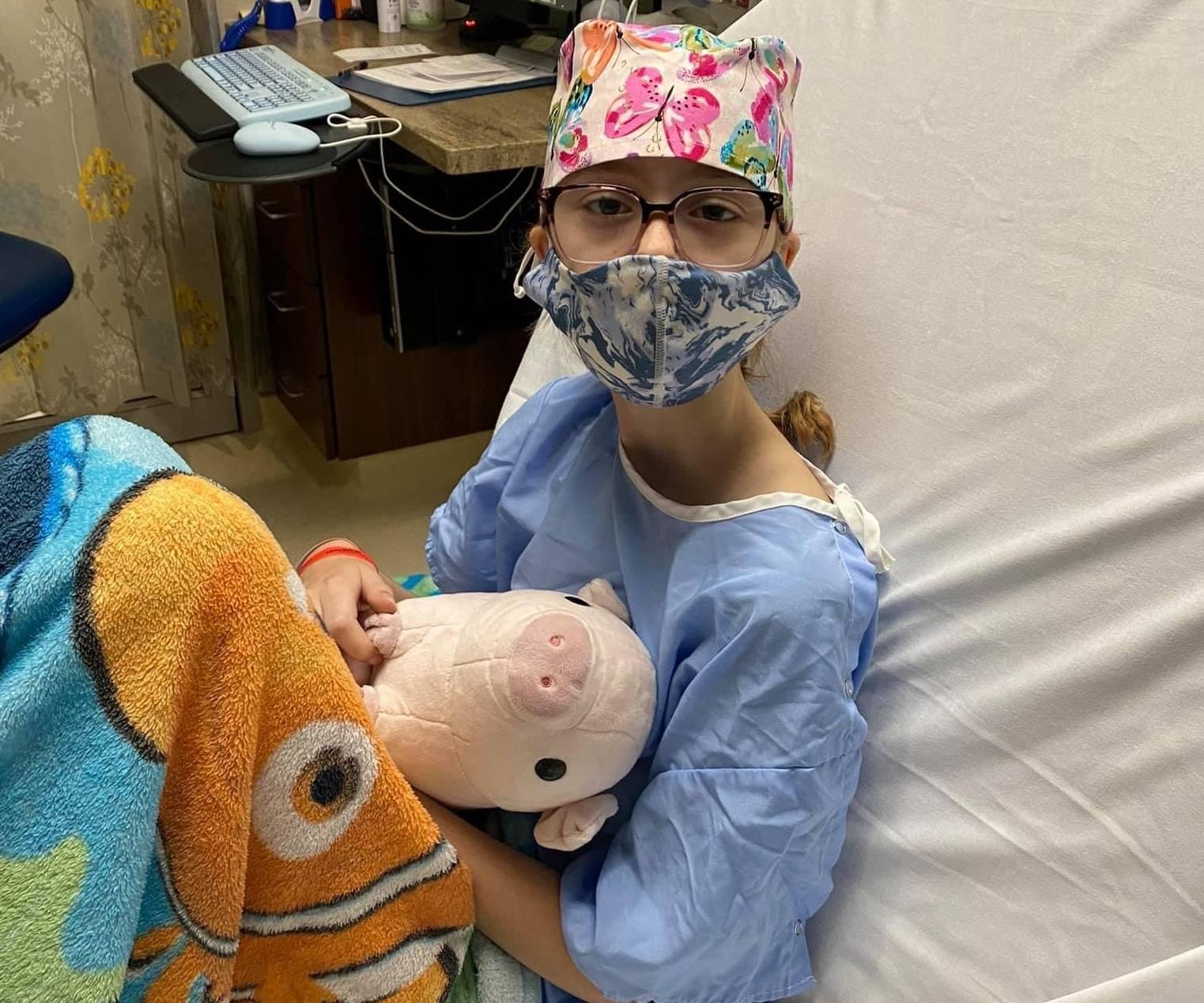-
 Individualized Medicine
Individualized MedicineYoung girl with rare disease gets life-changing diagnosis and targeted therapy at Mayo Clinic

Rare Disease Day raises awareness of the 30 million people in the U.S. who have a rare disease.
Araeya Sell, 13, has spent much of her childhood visiting her health care team and in the hospital. She has endured countless blood draws, scans, procedures and a surgery ― all in the search for answers to her complex symptoms.
"It started in kindergarten when Araeya just kept getting bladder infections," says her mother, Nicole Sell. "Her doctor put her on a low-dose antibiotic, and she was on that for three years."
By about the third grade, Araeya's health continued to deteriorate. She had more abdominal complications, rashes and severe weight loss that led to malnourishment. She fell behind in school and was often too weak for play dates with friends, Nicole says.
Still, the family hung their hopes on each new medical evaluation, including Araeya's next diagnosis: celiac disease, an immune reaction to eating gluten.
"She was put on a very strict gluten-free diet, but she would still get really sick. And she wasn't showing any improvement on the diet. So doctors came back and said that she actually did not have celiac," Nicole says.
Then came spinal surgery, as doctors pondered whether a tether in her spine was causing the issues. With her symptoms still unresolved, Araeya underwent a colonoscopy and an upper endoscopy. These procedures followed a suggestion she may have Crohn's disease, which is a type of inflammatory gastrointestinal disease.
After an exhaustive, nearly seven-year diagnostic odyssey, the Sells turned to Mayo Clinic.
"We needed to see somebody with more resources in order to look deeper," Nicole says. "We heard that Mayo uses a team of doctors to look at everything. And that's exactly what they did."
Mayo Clinic researchers and clinicians team up to solve rare diseases
At Mayo Clinic, thousands of clinicians and researchers are dedicated to solving complex medical mysteries. The Center for Individualized Medicine created the Program for Rare and Undiagnosed Diseases in 2018.
The program includes two dozen rare disease genomic clinics across multiple subspecialty practices at Mayo Clinic in Arizona, Florida and Minnesota. In 2021, a team of genomics experts within Mayo Clinic's Center for Individualized Medicine and the Department of Clinical Genomics used sophisticated next generation sequencing and other omic methods and analyses, along with worldwide collaborative research, to investigate approximately 700 rare disease cases. Overall, they provided a conclusive diagnosis to nearly one-third of patients, including 14 patients with newly discovered gene-disease associations.
At her first visit to Mayo Clinic, Araeya was seen by William Faubion Jr., M.D., a Mayo Clinic gastroenterologist. He suspected her confounding symptoms could be caused by a genetic variant.
"Complex cases such as these really require the integrated effort of a team of professionals, in particular our colleagues in Mayo Clinic's Center for Individualized Medicine," Dr. Faubion says. "It is the novel sequencing technologies and the pipeline of experts who can interpret the results and allow us to provide targeted therapies to rare conditions."
First, the team in the Center for Individualized Medicine selected a targeted multigene panel for Araeya, which is a focused analysis that simultaneously sequences a particular set of genes to look for any variations. Next, the team reviewed the comprehensive report that unraveled Araeya's genetic data and peeled back the complex layers that delved deep inside her DNA. The report revealed a significant discovery.
After years of searching for answers, Araeya finally had a definitive diagnosis: a disease-driving gene variation.
"Araeya harbors a pathogenic variant associated with immune dysregulation," says Filippo Pinto e Vairo, M.D., Ph.D., medical director for Mayo Clinic's Program for Rare and Undiagnosed Diseases, who helped solve Araeya's case. "Primary immune deficiency diseases are part of a group of 200-plus rare diseases that affect approximately 500,000 people in the U.S."
While many rare diseases have no therapeutic options, a targeted treatment was available for Araeya in the form of a monthly infusion. She started infusions in fall 2021. So far, she says it has been life-changing.
"I'm very thankful and I feel much better," says Araeya, who loves camping, crafts and hanging out with friends. "I have a lot more energy, and I'm not so tired all the time."
Boosting efforts to accelerate rare disease diagnoses
Mayo Clinic conducts rare disease research to accelerate diagnoses and identify therapeutic options for patients like Araeya. Efforts include the development of a new automated system that tracks scientific knowledge from around the world of pathogenic genetic variants and applying it to Mayo Clinic patients with rare and undiagnosed diseases.
Mayo Clinic also has joined a new Rare Disease Centers of Excellence Network that consists of 31 medical centers across the U.S. This network seeks to promote knowledge-sharing; connect patients to appropriate specialists; and improve the pace of progress in rare disease diagnosis, treatment and research.
Konstantinos Lazaridis, M.D., the Carlson and Nelson Endowed Executive Director for Mayo Clinic's Center for Individualized Medicine, says Mayo Clinic is in a unique position to improve diagnoses and therapies as well as fuel new discoveries for the care of patients with rare diseases.
"Mayo Clinic, through the collaborative efforts of the Department of Clinical Genomics and the Center for Individualized Medicine, is strongly poised to provide answers and healing to patients and families with rare disease," Dr. Lazaridis says.
Learn more
Read more stories about advances in individualized medicine.
Register to get weekly updates from the Mayo Clinic Center for Individualized Medicine blog.
Join the conversation
For more information, visit Mayo Clinic Center for Individualized Medicine, or Twitter at @MayoClinicCIM.










